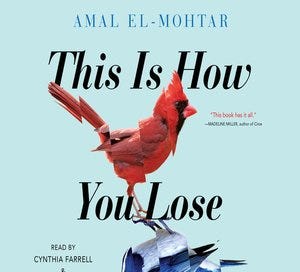A Simple Review: This Is How You Lose the Time War; Amal El-Mohtar & Max Gladstone
I'm not quite sure what to say about this one.
I’m struggling to agree with both the overwhelmingly positive, and rather negative reviews—this novel has proven itself to be rather controversial. While I enjoyed the emotional development between Red and Blue, I can’t seem to get past more than a few issues in regards to the rest of the novel. Overall, I’m giving this 2.5-3/5 stars, and I’ll explain why in depth. If you want a short explanation, simply scroll to the bottom.
(Spoilers Ahead)
For starters, the descriptions are incredibly complex, and not in a good way. The immersive style of writing only works if you have elements of a familiar reality sprinkled in to make the reader feel somewhat grounded, and the novel lacked any details I could grasp onto.
Second, any details that did make sense were dull, and therefore irritating.
“Trees fall in the forest and make sounds.” (31)
“She stifles the urge to run—towards, or away. . . (she) walks due south away from the north,” (77)
Seriously? Those are essentially textbook examples of how not to write descriptions. And the novel is unfortunately filled with these (Though admittedly, those are the worst of them. The others I can maybe forgive).
There also seems to be the tendency to insert a description, then follow it up with a phrase in parentheses that immediately dismisses that description as being accurate/relevant.
“Once, horsemen broke on fortifications like waves against a cliff. (Most of these men have not seen waves, or cliffs, but travelers bear stories from distant lands.)” (32)
“. . . [she] holds a sumac seed between her teeth, and bites. . . [she] pops out her left eye with her thumb and probes the socket until she finds the three sumac seeds. (The one she ate earlier was fake.)” (116, 117)
Once again, the book is chock-full of these. A tip for future writers, this shit is incredibly annoying. If you’re just going to take back the legitimacy of your descriptions right after you write them (especially through some strange narrative break), don’t write them in the first place. Using parentheses in your descriptions can work really well, when they benefit or add to your existing descriptions, not when they take away from them.
My last major gripe lies with what seems like an attempt to connect with a younger audience, which failed (Even though two of the quotes are from songs released in 1967). I noted at four different places in the beginning of the novel where they chose to say some cheesy ‘lingo’, and try to make it not cringy by putting “as the prophets say” before/after it. For example:
“our glorious future shines so bright I gotta wear shades, as the prophets say.” (13)
“‘Ontario sucks. As the prophets say.’” (25)
“But, as the prophets say, there ain’t no mountain high enough—” (42)
“As the prophet says: Everybody’s building them big ships and boats.” (66)
Just, ack. I understand this story is based on time travel both forward and backward, but with the way the rest of the language is written it just doesn’t mesh—it seems forced, and disrupts the narrative flow (especially since they didn’t stick with it through the rest of the novel).
Now with all that being said, there is a reason I didn’t give it a 0/5 stars rating. The relationship growth between Red and Blue is fairly well done. Even though at certain points it seems to be endorsing violence in relationships (which I can ignore considering they are both killing machines and that’s all either of them enjoy), the slow development of rivals to lovers works well here.
In particular, their growth prompted some beautiful quotes:
“. . . love spreads back through time. It claims our earliest association,” (129)
Which it does, doesn’t it? Once you learn to love someone you look back at past interactions differently. Suddenly you couldn’t imagine your life without the person, even though they’ve only been a part of it for a fraction of your existence. That first meeting, seems so much more important than it ever did beforehand. Love is one of the few grounding, relatable details included in the book, which makes Red and Blue’s relationship that much more enjoyable.
I also enjoyed one of the letters, specifically the one that starts on page 79. It’s Red’s initial confession to Blue, and the emotion spelled out on the page is incredible. While I don’t want to quote the entire letter in my review, I cam summarize it by saying that it covers how one feels when they want to give their all to another. Their body, mind, soul, past, present, future. . . everything to that one person. It’s a willing sacrifice (in this case both metaphorically and literally) that is hard to write about in accurate detail, and this letter is just beautifully written.
While I do have more to nit-pick, I’ll leave it here (since my other qualms are more so personal than founded in established writing principles). Overall, this was hard to get through. The descriptions were either wildly complex or lack luster, and some of it was downright irritating. However, the emotional complexity between Red and Blue along with their relationship’s development in general were well written, and I quite enjoyed how they chose to express their love to each other (considering the circumstances, and who they are as not quite human, but not without humanity).



